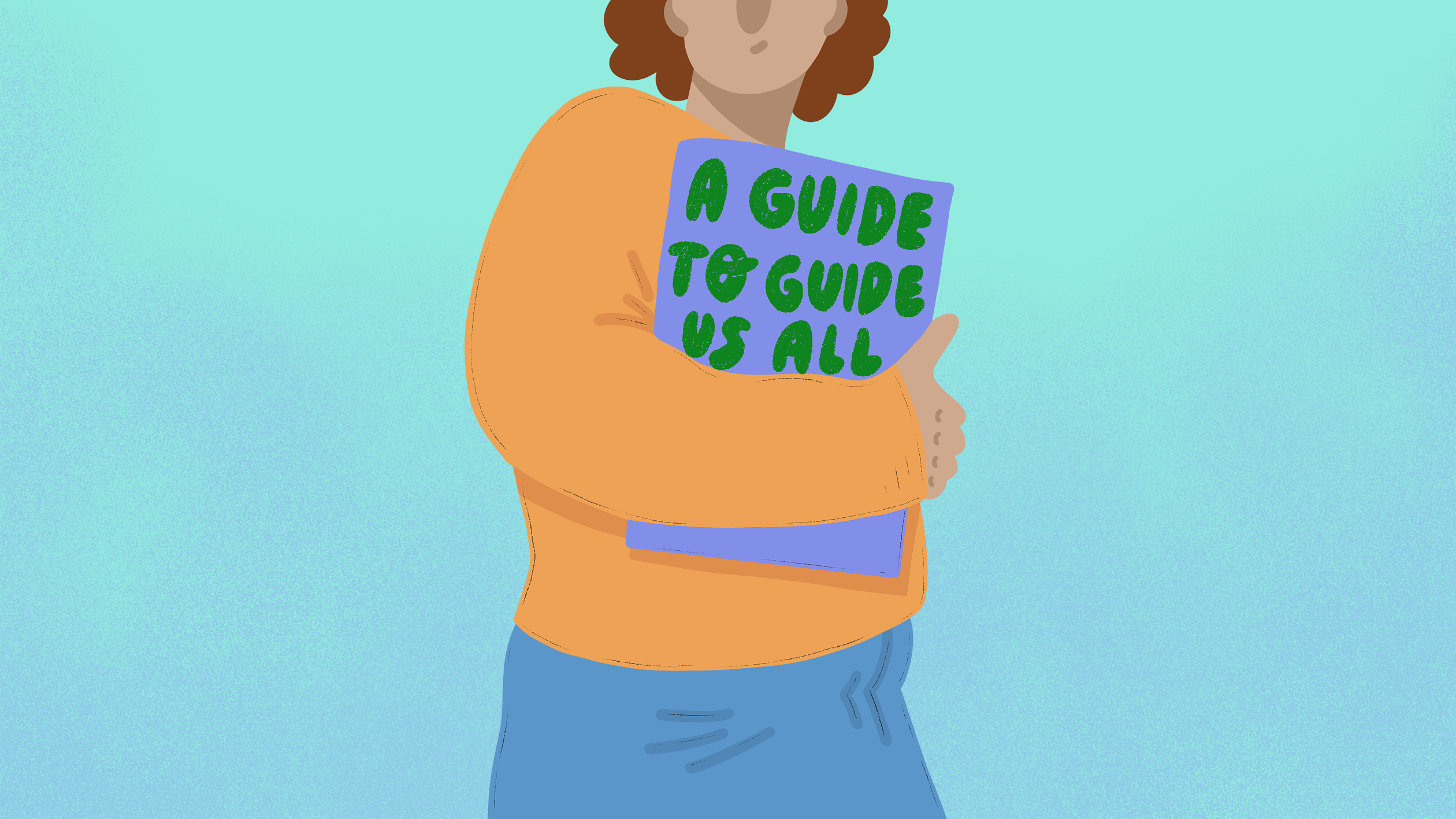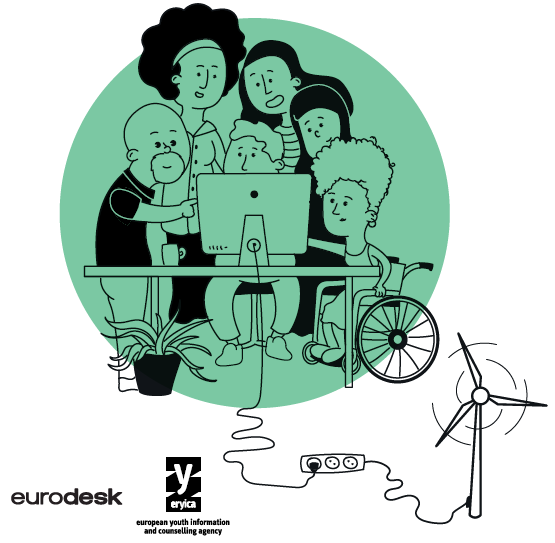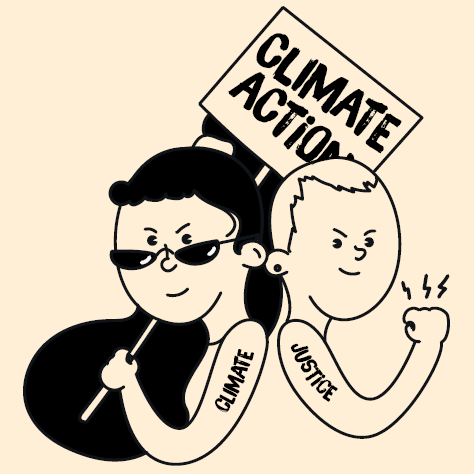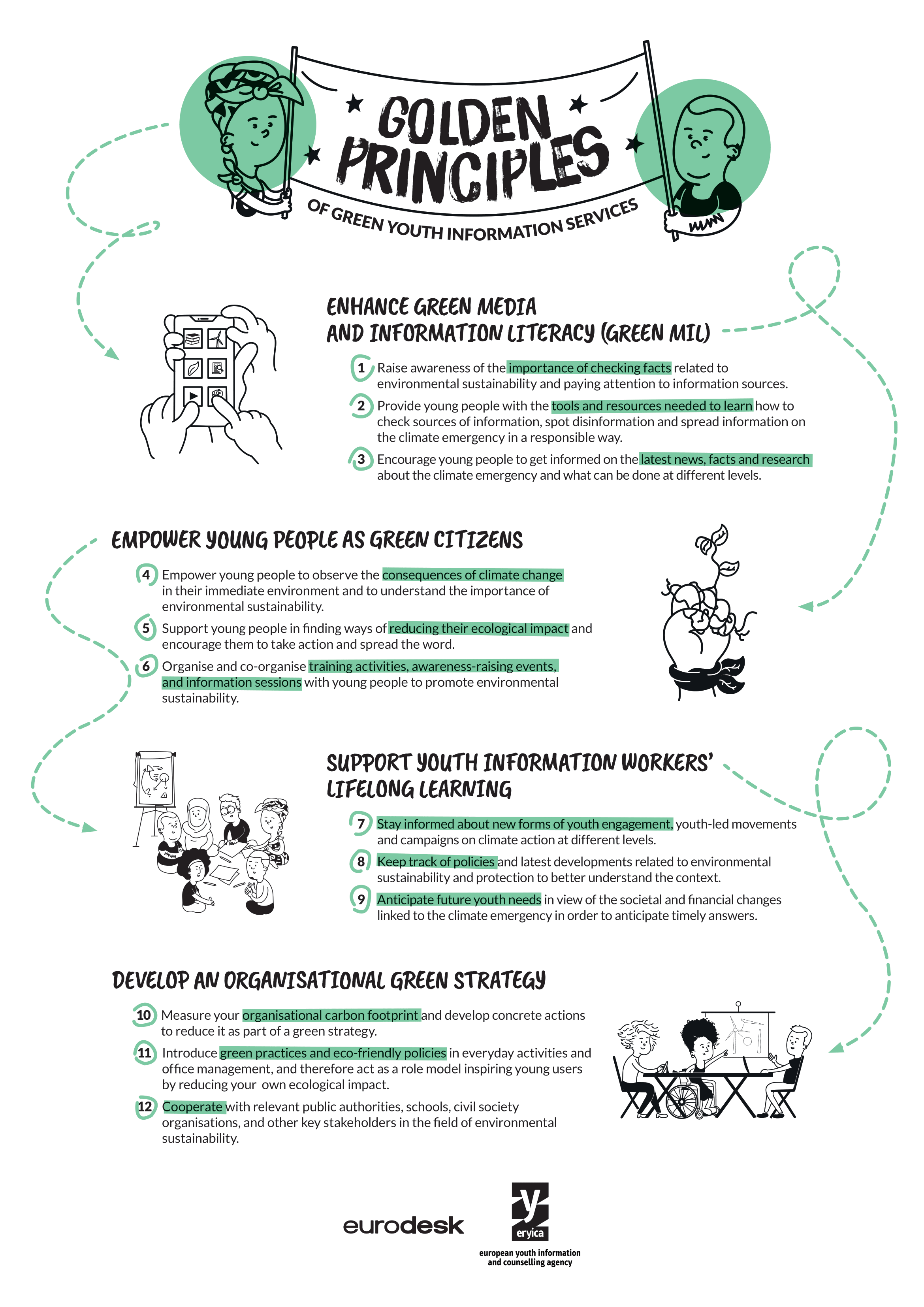
Illustration by Daniela Nunes
Greening youth information services
How is the provision of youth information becoming more eco-friendly?
by Eva Reina and Imre Simon, European Youth Information and Counselling Agency (ERYICA)
Youth information services always aim to provide young people with reliable, comprehensive, up-to-date and youth-friendly information. This essential objective supports their right to make informed decisions and helps them gain autonomy, develop critical thinking skills and become active citizens. Despite the evident differences regarding how youth information services are organised and delivered across European countries, the universal demand for accurate, timely and understandable information remains a top priority for all of them. Undoubtedly, access to information is a prerequisite for healthy social integration, access to rights and interpersonal development.
This policy priority is reflected in the EU Youth Strategy (2019-2027). The EU Youth Goals, proposed by young people and annexed to the Strategy, highlight information in Goal 4, “Information and constructive dialogue”. The aim of youth information is not only to respond to the needs, interests and requests of young people – certainly a key objective – but also to anticipate their needs and develop preventive measures accordingly.
However, currently another question arises: how can all this be done in a sustainable, environmentally-friendly way, after the European Parliament declared climate change a European and global emergency? How can we ensure that the very services and organisations that are meant to help young people do not contribute to worsening their climate anxiety? This article will focus on the environmental dimension of sustainability and how youth information and counselling services and youth organisations can and should contribute to a greener and more sustainable Europe.
 A guide to guide us all
A guide to guide us all
To overcome the above challenges and to offer solutions, ERYICA and Eurodesk developed the Greening Youth Information Services Guide. Its aim is to explore the role of youth information work in the context of the climate emergency, as well as to provide concrete tips and examples of good practices when it comes to designing and providing greener youth information services. The guide provides examples for youth information workers on how to inform, engage and support young people on environmental sustainability. The aim is also to raise awareness about the importance of greener youth information strategies and youth programmes among service providers, youth organisations and policy makers.

 Youth information going green
Youth information going green
The guide explores the mission, scope and relation between youth information services and environmental sustainability. Three different areas of action are analysed to define the focus of youth information activities.
Enhancing media and information literacy on climate change narratives
UNESCO defines media and information literacy (MIL) as an interrelated set of competencies (knowledge, skills and attitudes) necessary for today’s society. The media and information literacy concept harmonises and groups the many related literacies needed in the digital age. These include news, television, film, picture, computer, internet and digital literacies, as well as other emerging concepts like social media literacy. It is also of great importance for raising awareness and acting on sustainability.
Green media and information literacy (Green MIL) uses the skills, attitudes and knowledge mentioned above to enhance critical thinking and the capacity to deal with a massive load of information and disinformation regarding environmental sustainability and climate change. It helps young people identify, select, use and multiply the most reliable, up-to-date and relevant information on environmental issues. It supports them to make well-informed decisions and formulate opinions regarding climate action. For example, basing arguments on the latest scientific research rather than on blogs expressing personal views, or scrutinising information sources supporting or questioning climate change before posting them on social media.

Promoting active citizenship and engagement on environmental protection
One of the critical priorities of youth information and counselling services is to promote active citizenship and informed advocacy. This aspect is well reflected in the European Youth Information Charter, which recognises in principle 5.3 that youth information services should promote active citizenship and participation.
Access to information is an indispensable precondition for meaningful, active citizenship. Young people must know the meaning of activism, the possibilities for action, what a movement or group represents, and how much it aligns with their principles and aspirations. On the one hand, youth professionals should help young people creatively channel their will to act and be heard. On the other hand, youth information workers should provide young people with the appropriate skills and information to critically assess messages, intentions and potential risks and produce and disseminate content wisely. The crucial role of youth information services in this context is to offer support, information and spaces for young people to discuss, debate and think about how to get involved and act at every level.

Promoting environmental sustainability and green practices
Greener practices and services, as well as encouraging active citizenship and critical thinking regarding climate sustainability and action, should be at the heart of youth information and counselling and youth work. Young people must make crucial decisions about their personal life, education and career, shaping their lifestyle and interaction with the world. The impact of these choices is highly influential on the community, society and the environment as a whole. These autonomous first-time decisions must be based on comprehensive, unbiased, complete and verified information.
Youth (information) workers should also keep in mind that there are a lot of initiatives and organisations eager to help them in this journey; we are not alone. As we cannot be experts in everything, co-operation across sectors and stakeholders is essential.
Inspiring examples from the youth information sector, youth organisations and other stakeholders can be explored to showcase how youth information services and youth work providers can work on each axis.

 Driving your green strategy: key steps for building a participatory process
Driving your green strategy: key steps for building a participatory process
Did you know that the ecological footprint of emailing per internet user is the equivalent of driving a car for one kilometre – per day? Greening Youth Information Services inspires with tips and insights on how to drive a green strategy as a youth information service, youth centre or youth organisation. It offers key steps on how to design a comprehensive green strategy and highlights the importance of building participatory processes with different actors. Then, you will be able to go deeper into how to deal with office supplies, energy consumption, events and meetings, publications or promotional products. Take a very practical approach and learn from a wealth of hands-on tips for going green. The guide’s comprehensive take includes reducing our digital footprint too.

 Policy recommendations
Policy recommendations
The work on creating a sustainable future is something we can all contribute to. However, it is essential to ensure that we have sufficient support from policy makers and stakeholders in creating a supportive environment for the green transition. Therefore, Eurodesk and ERYICA also provide policy recommendations and stress the importance of quality youth information for all, participative approaches in youth information work and green youth programmes. We have outlined three areas of recommendations for those who create policies and those who work with and for young people.
 Toolbox of green non-formal education activities
Toolbox of green non-formal education activities
Greening Youth Information Services also provides a toolbox with examples of non-formal education activities that can be used to address environmental sustainability issues with young people. Explore some tips and recommendations on how to make your training activities more eco-friendly. The activities are described in the same way that training manuals do and they are ready-to-use resources for youth (information) workers.
Finally, we provide a Green Glossary aiming to further define and illustrate certain concepts which may require more detailed explanation. The guide is complemented by three posters.

 Are we there yet?
Are we there yet?
In youth information work, we believe that all the above can be achieved and must be realised. As youth professionals, we take responsibility for the planet we leave for the current and next generations and provide them with the information, skills and attitudes to shape it actively and positively.
To succeed in this endeavour, we first need quality youth information for all young people. Equal access to quality information is a prerequisite for active citizenship and participation. Youth information and other forms of youth work must implement participative and inclusive approaches regarding environmental sustainability and climate action. Youth information services must also democratise understandable and appropriate information on this topic, considering different groups and needs.
Secondly, young people must be heard and be able to impact policy and decision making. Youth information professionals are key players in supporting youth media and information literacy while upskilling and enhancing their means to channel their advocacy and activism efforts better. Lastly, youth services and programmes must promote green practices and become greener themselves in order to be more adapted to the global challenges and demands of young people. The spaces and services used by young people and the administrative and financial rules by which youth organisations and individuals are bound must favour and enable environmentally-friendly choices.
All of us must assume the role we play in achieving sustainability. We at youth information and counselling services have started to play ours. How about you?
This article is based on the guide Greening Youth Information Services, published in 2020 by ERYICA and Eurodesk. The complete guide is available on the websites of ERYICA and Eurodesk in English, French, Greek, Slovak and Spanish. For more information, you can also contact the ERYICA Secretariat or Eurodesk Brussels Link.




